Bogotá, Colombia—One of the humiliations of being a Philippine passport holder is having to go through all kinds of visa applications and all kinds of requirements to file those applications.
For some, the need to apply for visas comes with the privilege of being able to travel, and should be seen as just another inconvenience just like having to take off shoes and belts to go through airports.
But for many, it is another steep barrier to traveling abroad—with employment, education, or togetherness with loved ones at stake. Unable to navigate the complex labyrinth of embassies and their subcontracted application centers (e.g., the inefficient Visa Facilitation Services or VFS), they end up relying on agencies and individuals; even then, the success of the application is not guaranteed. In any case, the process of getting a visa becomes even more tedious than the actual (and already high) cost of the visa itself.
Some might dismiss this concern as a “rich people problem”—but I doubt if the really rich will agree, given that many of them already have, or could easily afford, other citizenships, golden visas—and in any case, have other people take care of their visa concerns. While most of us are affected, visa problems actually become even more difficult for those with less means, making it a matter of inequality.
The explanation, of course, is that our diplomatic and economic standing means that, for many countries, Filipinos must prove their bona fides before being allowed to enter. I would like to think that the Department of Foreign Affairs and our various diplomatic missions have tried behind the scenes to lobby for more relaxed visa policies for Filipinos, but alas, our passport remains among the weakest in the world (In comparison, for instance, the Mexicans and Malaysians don’t need visas to the Schengen area, and even the Indonesians can go to Japan visa-free).
I would like Euro-American countries to see friendlier visa policies as part of their reparations for colonialism, and, in any case, as part of efforts to make the world more equitable. Beyond lifting visa requirements, reducing or eliminating fees, extending validities, and shortening processing times can make a big difference, not just in the Philippines but in many parts of the world, for whom these visas contribute to global inequality, both in general terms and in particular realms, like academia and the arts, as well as for young people who would stand to profit from seeing the world. (It is worth adding that many countries exempt US and Schengen visa holders from their own visa requirements, making this call even more important).
Meanwhile, for those of us with the privilege to do so, I think we need to appreciate the 60 or so countries that welcome Filipinos without a visa (or without such unreasonable requirements) by actually visiting them, and prioritizing them over those that impose harsh visa regimes.
Southeast Asia, for instance, offers so much even beyond the usual places like Singapore and Bangkok; the rest of Asia is immensely diverse, and countries like Kazakhstan, Uzbekistan, and Taiwan have recently made it easy for Filipinos to visit, while Israel, India, and Nepal have always been accessible to us.
Latin America, too, is quite open to Filipinos—not just in terms of visas but in terms of being welcoming and friendly; Brazil (which is like a continent in itself), Colombia, Peru, and Bolivia are all available to visit visa-free (Unfortunately, Ecuador—which previously welcomed Filipinos without a visa—now charges an exorbitant $450 for a tourist visa).
As for Africa, various countries like Ethiopia, Morocco, Kenya, Tanzania, and even South Africa are all either visa-free or offer e-visa or visa on arrival.
Of all the continents in the world, Europe has been the most unwelcoming to Filipinos—notwithstanding the fact that Spain has been fairly generous to its other former colonies in terms of travel privileges. However, the two European countries that only require easy-to-obtain e-visas—Georgia and Armenia—are incredible, and one can spend an entire month just exploring them.
What’s fascinating is that, since they are not usually visited, the countries I mentioned above are more likely to be eye-opening in terms of broadening our perspectives and cultural horizons, as I have experienced for myself—for instance, in my recent, seven-country Eurasia trek, for which all I needed were easy-to-get online visas.
Thankfully, more and more countries are offering e-visas, and the overall global trend is towards friendlier visa policies—even as events like 9/11 and COVID-19 can also make the world revert to closed borders and fragmentation.
In any case, amongst the countries that do not make it hard for us to enter or get visas—not to mention our own beautiful country—there are already a lifetime’s worth of places to visit.
——————
glasco@inquirer.com.ph


